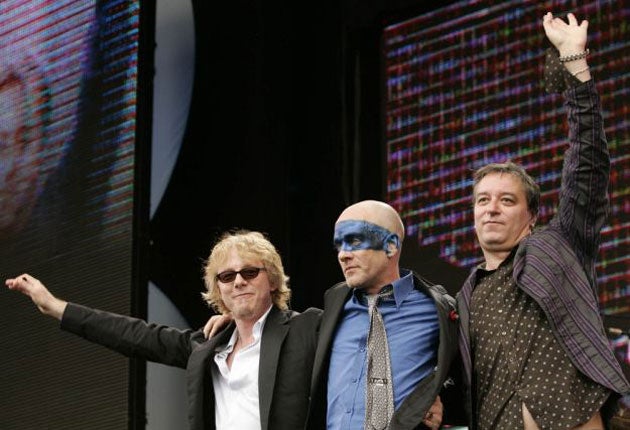End of the band as we know it: REM split after 31 years

Your support helps us to tell the story
From reproductive rights to climate change to Big Tech, The Independent is on the ground when the story is developing. Whether it's investigating the financials of Elon Musk's pro-Trump PAC or producing our latest documentary, 'The A Word', which shines a light on the American women fighting for reproductive rights, we know how important it is to parse out the facts from the messaging.
At such a critical moment in US history, we need reporters on the ground. Your donation allows us to keep sending journalists to speak to both sides of the story.
The Independent is trusted by Americans across the entire political spectrum. And unlike many other quality news outlets, we choose not to lock Americans out of our reporting and analysis with paywalls. We believe quality journalism should be available to everyone, paid for by those who can afford it.
Your support makes all the difference.R.E.M.'s sudden announcement on their website last night that they were splitting up after 31 years was a bolt from the blue, catching even some of those close to them I contacted unawares. But as soon as the news had sunk in, it seemed only natural and right. From their first single, "Radio Free Europe" in 1981 until their greatest LP, Automatic for the People, 11 years later, R.E.M.'s career was an immaculate commercial and critical progression. Each album sold more than the last (they eventually sold 85 million), until finally, with Automatic songs such as "Everybody Hurts", they made their perfect record.
But the seven studio albums since have veered from brilliant, under-selling experiments (New Adventures in Hi-Fi [1996], Up [1998]) to desperate, irrelevant self-parody (Reveal [2001], Around the Sun [2004]). What is now their final album, this year's Collapse Into Now, was a deliberate, convincing return to original strengths, while never suggesting they had anything new to offer.
While going over their past for a greatest hits collection which will become their career capstone, the band seem to have reached the same conclusion. "We started asking ourselves, 'what next?'," bassist Mike Mills wrote on their website by way of farewell. "Working through our music and memories from over three decades was a hell of a journey. We realized that these songs seemed to draw a natural line under the last 31 years of our working together."
It was December 1987 when Rolling Stone declared them "America's Best Rock & Roll Band" on their cover, an unofficial crown they took from Talking Heads. That year's album, Document, their fifth, had just given them their first US Top 10 single, "The One I Love"; a steady, survivable climb towards the top no band is likely to be granted again. "Radio Free Europe" really had sounded like a resounding call for rock freedom from the occupied synth-pop territory of 1981. Their first album, Murmur, on which Michael Stipe's lyrics were often indecipherable mumbles, showed how much mystery could still be mined from electric guitars, at a time when they seemed bound for extinction. This unknown college band from Athens, Georgia kept the flame of intelligent and uncompromised rock burning then. "We're the unacceptable edge of the acceptable stuff," Peter Buck told the magazine with typical, modest perception.
When Nirvana brought a less palatable howl of disquiet up from the underground in 1991, R.E.M. became still bigger by continuing to follow their own path with a mandolin-heavy country-rock album, Out of Time. "R.E.M. were the first band to show us you can be big and still be cool," their peer Steve Wynn from the Dream Syndicate told Mojo magazine around then. Nirvana's Kurt Cobain, a friend of Stipe, thought the band's graceful ability to sustain the quality of a questing, punk-inspired underground band in the heart of the mainstream – which he had such fatal difficulty with - verged on the saintly. Stipe had his own take. "We always felt U2 set out to be the biggest band in the world...[whereas] we didn't really set out to anything but travel around in a van." Peter Buck, for one, R.E.M.'s guitarist and rock'n'roll conscience, would no doubt be grateful to go back to doing just that.
They stopped being the biggest or best band in the world more than a decade ago. But for the grace with which they managed being both for so long, which they've regained by realising that their time is past, we should raise a respectful toast to R.E.M. today.
Join our commenting forum
Join thought-provoking conversations, follow other Independent readers and see their replies
Comments